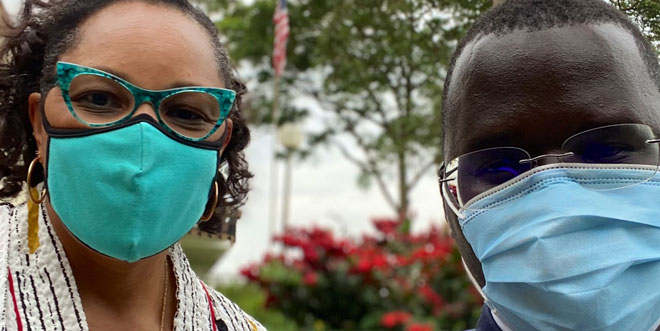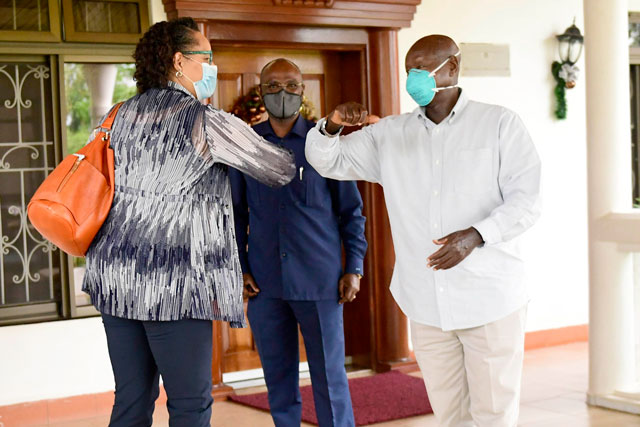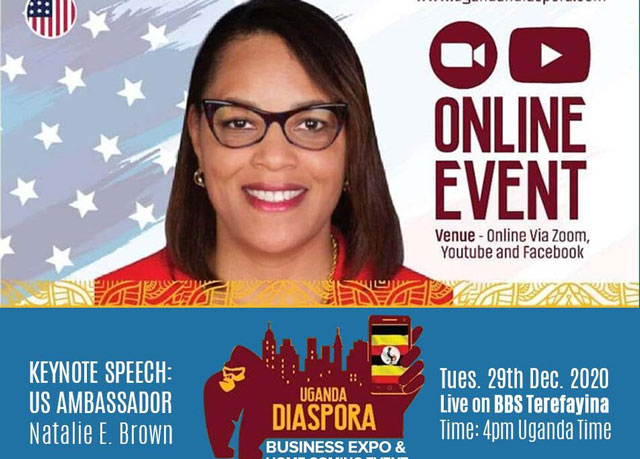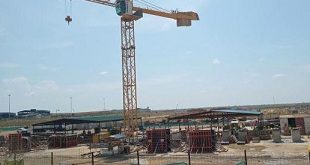
Kampala, Uganda | THE INDEPENDENT | The U.S. Ambassador to Uganda Natalie E. Brown has warned that there will be consequences for those who undermine democracy in the country.
“The United States, along with other like-minded, democratic countries, will pay close attention to actions of individuals and organizations who interfere in the democratic process or instigate violence against the civilian population before, during, or after the elections. We will not hesitate to consider consequences for those found to be responsible for election-related violence or undermining the democratic process,” Natalie E. Brown said yesterday.
The US Ambassador added that, “today, the eyes of the world are on Uganda. How Ugandans approach the election and its outcome – regardless of the winner – will have an impact on both the country’s standing in the world and its future domestically.”
She was making a keynote address for the virtual Uganda Diaspora Business Expo and Homecoming that was relayed on Zoom, Youtube and facebook. (full speech and video bottom)
Warning repeated
The US warning, first made last week by Assistant Secretary of State for African Affairs Tibor Peter Nagy, was repeated today after human rights lawyer Nicholas Opiyo was finally granted bail after more than a week in custody. Opiyo, the executive director of Chapter Four Uganda, a human rights organization was arrested last week, Tuesday on allegations of laundering.
“We welcome today’s release on bail of Nicholas Opiyo. Civil society actors and human rights defenders play a vital role in educating the citizenry and must be allowed to carry out their work free from harassment. There will be consequences for those who undermine democracy,” the US Mission in Kampala said on twitter.
The messages come four days after Ambassdaor Natalie E. Brown met President Yoweri Museveni December 27, one of the candidates in Uganda’s elections, for what it called “an open exchange on bilateral relations and conditions needed for Uganda’s growth and to attract private sector investment, which include free, fair, inclusive, and peaceful elections, as well as a vibrant civil society.”
Museveni on his part simply said of the meeting; “Held a private meeting with the US ambassador aand ambassador Adonia Ayebare at my country home in Rwakitura, Kiruhura District. Thanks ambassador for your time.”

United States talks tough after Opiyo arrest
Five days ago, the United States Assistant Secretary of State for African Affairs , Tibor Peter Nagy Jr reacted to the arrest of Ugandan human rights lawyer Opiyo with a statement.
“The United States calls for the immediate release of respected Ugandan human rights attorney Nicholas Opiyo. There will be consequences for those who are continuing to undermine democracy just three weeks before Uganda’s election,” he said.
The Partners for Democracy and Governance Group (PDG) also issued a joint local statement on the “Arrest of Human Rights Activists in Uganda.”
Fourteen nations, including the United States, & the European Union delegation to Uganda issued the statement.
It said, ” We strongly emphasize the right of every Ugandan citizen to a due process including swift arraignment and formal notification of the charges, thorough investigations by national authorities as well as orderly access to legal representation, family and health professionals. If no charges are to be brought then we call for their immediate release.”
“Human rights defenders play an important role in every country and should be able to work without fear of arrest or reprisals, wherever they are.”
The Partners for Democracy and Governance Group (PDG) issued Dec. 23 a joint local statement on the “Arrest of Human Rights Activists in Uganda.” Fourteen nations, including the United States, & the European Union delegation to Uganda issued the statement. #Uganda #HumanRights pic.twitter.com/ZheNCsTP8L
— U.S. Mission Uganda (@usmissionuganda) December 23, 2020
New Ambassador warns
“A significant challenge, and a challenge with long-term ramifications, is the political environment in the lead up to the January 14 elections,” said Natalie E. Brown her remarks at Tuesday’s keynote address for the virtual Uganda Diaspora Business Expo and Homecoming.
“I want to make it unequivocally clear: The United States government does not support any specific candidate or party in Uganda’s upcoming elections. The United States supports the democratic process itself, as Secretary Pompeo recently stated, when he asserted the United States commitment to supporting free, fair, inclusive elections. This includes ensuring the safety of all candidates, respect for the rule of law, and the impartiality of the authorities in charge of managing the elections. This election is about the will of the Ugandan people,” told the conference.
Uganda’s elections have in the past month been marred by arrests of candidates as security enforce SOPS for the management of the Coronavirus. Last month, close to 50 people were killed in riots that followed the arrest of one of the candidates, Robert Kyagulangyi aka Bobi Wine.
Kyagulanyi was released and has since then had running battles with security, resulting in the death of one of his bodyguards at the weekend. He now moves in the campaigns donned in a bullet proof vest.

Ambassador Natalie Brown said, “the United States has no agenda other than to help ensure that the Ugandan people participate, and can cast their vote for the candidates of their choice. We support a free, fair, credible, and peaceful process.“
She said “delivering a free, fair, inclusive, and peaceful election is vital to Uganda’s democracy, its international reputation as a strong and stable regional leader, and its future economic growth.”
Free and fair elections and respect of human rights, she stated, create a favorable business climate, and a lack of these elements can impede foreign direct investment.
“Foreign investment, trade, and tourism are all critical for Uganda’s economic growth, jobs, and security. If the upcoming election results in violence or serious undermining of democratic norms, the economy, businesses, job-holders, and individual families – all Ugandans – could pay a heavy price.”

*******
FULL KEYNOTE SPEECH
U.S. Ambassador Natalie E. Brown Keynote Address for the #Uganda #Diaspora Business #Expo and Homecoming
Thank you, Dr. Maggie Kigozi, for the warm introduction. And thank you to the Uganda Diaspora Network for organizing today’s virtual event. I am delighted to join you and to have the opportunity to talk about how we can increase trade and business ties between the United States and Uganda.
While this past year has introduced challenges most of us never imagined, it has also ushered in innovation and highlighted new possibilities. I believe there is a tremendous amount of value that is yet to be created through trade and investment between our two countries. That said, I also want to acknowledge up front that Uganda is facing challenges that may endanger its trajectory toward prosperity – and I will return to those challenges in a moment – but if it can get past those challenges, the possibilities are limitless.
I further believe that U.S. investment—including that of Ugandans living in the United States and other countries abroad—can create the employment opportunities Uganda needs to sustain its young and ever-growing population, and to ensure that the Ugandan people meet their full potential and are able to pursue their dreams.
A very important part of my job as U.S. Ambassador to Uganda is to help U.S. companies invest and do business here – facilitating the deals that benefit both the Ugandan and the American people. The United States believes that private sector-led growth is fundamental to the future of the country. It is you, private sector investors, who can help generate economic growth and create jobs, both in the United States and in Uganda. Your investments here, and the economic activity that you create, drive prosperity here and prosperity at home.
Uganda’s large, English speaking, and educated population; abundant natural resources; infrastructure needs; and tourism potential provide many opportunities for American investors and Ugandan investors living abroad. Many of you are joining today as you consider building partnerships on the ground and investing in Uganda’s growing market.
My Embassy colleagues and I, as representatives of the U.S. government, will continue to look for ways to help make your jobs easier, including by helping Ugandan officials see the benefits of both partnering with the private sector and using private sector finance.
U.S. companies and investors bring unique experience, expertise, and value to Uganda’s economy, and working together, I am confident we can better convey this message in Uganda to expand our economic footprint here. And as members of the diaspora, you know better than anyone the immense opportunities that can be unlocked in Uganda. Therefore you can play an important role in promoting Uganda abroad, in attracting diaspora entrepreneurs and investors to Uganda, and in advocating for the conditions and policies that will allow your companies to thrive while improving the prospects of Ugandan citizens.
Supporting U.S. commercial interests and mutually beneficial trade is an integral part of the State Department’s work and, more specifically, the work of the U.S. Embassy here in Kampala. Across all of our U.S. government agencies, Embassy staff actively seek out opportunities to increase trade and strengthen business ties between the United States and Uganda, to benefit both the Ugandan and the American people.
VIDEO
While we are very proud of the close to $1 billion of foreign assistance the United States government provides Uganda each year, primarily in healthcare to combat HIV/AIDS, we know that the private sector is the real engine for long-term sustainable economic growth.
When my team and I speak to potential investors, we often cite the top five reasons we believe Uganda has been an attractive destination for investors. I thought this might be useful to share with you today.
- Growing Free Market Economy: Uganda has averaged 5% GDP growth over the past five years, and despite the economic impact of the COVID-19 pandemic, 3.5% average growth is projected over the next two years. We anticipate that it will begin to rise after that.
- Substantial and Rapidly Growing Consumer Market: Uganda’s population of 44 million people is growing at a rate of 3% per year, with 58% of Uganda’s population under the age of 15 and 78% under 30.
- Dynamic Agricultural Market: Uganda has abundant fertile land, favorable weather, and both small and large-scale production throughout most of the country.
- Emerging Oil Industry: Uganda has an estimated 1.4 billion barrels of recoverable oil, and the government projects oil production will begin in approximately 2024.
- East African Community Customs Union: Uganda’s membership in the EAC Customs Union enables duty free exports to the 160 million-person EAC market, as well as duty free exports of a wide range of goods to the United States via AGOA – the African Growth and Opportunity Act – and the Generalized System of Preferences.
And in our view, some of the top prospect sectors for exports to and investment in Uganda, which the diaspora community may want to consider, include:
the oil & gas sector where there are opportunities around: engineering, project management services, vocational training services, environmental hazard management services, and petroleum industry equipment exports.
the power sector where there are opportunities for: exporting renewable energy equipment and services for on-grid, off-grid, and micro-grid applications; energy transmission and distribution projects; and engineering and environmental management services.
agriculture where we see opportunities such as: equipment for value-added production of agricultural products, irrigation systems and their components, and provision of agriculture management services.
construction where there are opportunities like: architecture services; construction equipment sales; project management services; and environment management services.
information and communications technology where there are opportunities for: building data centers; providing data security services and internet services; and exporting telecommunications hardware, fiber optic equipment, and network hardware.
And finally, the healthcare space where there are opportunities for: provision of pharmaceutical, medical diagnostic, and treatment equipment; and investing in pharmaceutical facilities.
While Uganda has great potential for future economic growth, we are nevertheless all very well aware of the challenges of doing business here.
A perennial challenge is the problem of corruption. The Transparency International Corruption Perception Index of 2019 ranked Uganda 137th out of 180 countries, with a score of 28 out of 100 points. While this is an improvement by two points from the 2018 index, it demonstrates there is still much work to be done on corruption and accountability in Uganda. Reports from Ugandan anti-corruption champions further indicate that Uganda and its people lose up to $1 billion annually to corruption. Corruption stifles development and curbs foreign direct investment potential, and corruption is one of the primary barriers U.S. companies face when looking to invest in Uganda.
I recognize that the Government of Uganda has placed considerable emphasis on institutional reform to combat corruption, but combatting this scourge requires effort from all corners. The government must hold everyone who engages in corruption accountable. The legislation put in place to strengthen accountability and fight corruption must be applied consistently with transparent and open court proceedings. Individuals must begin to reject corruption and reject those offering a share in its proceeds. And you, as investors, must demand accountability and refuse to take part in corrupt acts. Stamping out corruption is key to economic development and helping businesses thrive.
A significant challenge, and a challenge with long-term ramifications, is the political environment in the lead up to the January 14 elections.
I want to make it unequivocally clear: The United States government does not support any specific candidate or party in Uganda’s upcoming elections. The United States supports the democratic process itself, as Secretary Pompeo recently stated, when he asserted the United States commitment to supporting free, fair, inclusive elections. This includes ensuring the safety of all candidates, respect for the rule of law, and the impartiality of the authorities in charge of managing the elections. This election is about the will of the Ugandan people. The United States has no agenda other than to help ensure that the Ugandan people participate, and can cast their vote for the candidates of their choice. We support a free, fair, credible, and peaceful process.
The United States, along with other like-minded, democratic countries, will pay close attention to actions of individuals and organizations who interfere in the democratic process or instigate violence against the civilian population before, during, or after the elections. We will not hesitate to consider consequences for those found to be responsible for election-related violence or undermining the democratic process.
Application of the law or actions by authorities that favor one candidate or party over another, human rights violations such as the mass shooting of unarmed civilians and arbitrary arrests of activists, and the repression of civil society – including restricting the ability of the media to operate freely and intentionally misapplying terrorism laws to repress respected civil society organizations – violate both the letter and the spirit of Uganda’s Constitution. These actions cause the government of the United States to question the fundamental basis of our partnership and they certainly have a chilling effect on the business and investment climate.
Delivering a free, fair, inclusive, and peaceful election is vital to Uganda’s democracy, its international reputation as a strong and stable regional leader, and its future economic growth.
Free and fair elections and respect of human rights create a favorable business climate, and a lack of these elements can impede foreign direct investment.
Foreign investment, trade, and tourism are all critical for Uganda’s economic growth, jobs, and security. If the upcoming election results in violence or serious undermining of democratic norms, the economy, businesses, job-holders, and individual families – all Ugandans – could pay a heavy price.
The United States, including the executive and legislative branches of government, the international community, and others are watching closely and in some cases, already reacting. Just this month, organizers of the International Conference on AIDS & STIs in Africa (ICASA), an area where Uganda has made great strides, withdrew Uganda’s rights to host ICASA in 2021, citing human rights concerns during the election campaign. Absent an immediate improvement in the environment and an end to violence and intimidation, this could be the first, of what could be many, negative repercussions to the Ugandan economy and Uganda’s international image.
But these clouds don’t have to result in a destructive storm. The government of Uganda is fully capable of holding a free, fair, inclusive, and peaceful election if it chooses to do so. And we will continue to help U.S. businesses and other groups like this diaspora business expo understand what we see as the most attractive commercial opportunities Uganda offers. We will also continue to engage the Ugandan government on how it can best attract diverse investment and trade, including from the United States, by fighting corruption, cutting bureaucratic red tape, and respecting human rights and democratic institutions.
Today, the eyes of the world are on Uganda. How Ugandans approach the election and its outcome – regardless of the winner – will have an impact on both the country’s standing in the world and its future domestically. This election offers Uganda the opportunity to inspire and shape the future of the region and the world. We stand with all Ugandans who seek to deepen democracy and advance prosperity for all.
Finally, I want to underscore how proud I am of the efforts that Uganda’s diaspora network and U.S. companies more broadly have made that highlight the advantages a sustainable development model brings to Uganda.
American companies offer the transparency, sustainability, and corporate social responsibility that help drive real growth. Our companies focus on developing the skills of local employees, to help prepare Uganda’s future generations to be business leaders. These are the values we strive to embody.
I ask you today as the diaspora community – please stay the course on this worthy effort! Working together with a focus on quality and integrity can differentiate American companies and investors from those from other countries and make us trusted and valued partners in Uganda and around the world.
Thank you again to the Diaspora Business Expo & Homecoming event for providing us the opportunity to gather together virtually.
I wish you a happy and safe New Year and I urge you to continue to identify ways to build our communities.
 The Independent Uganda: You get the Truth we Pay the Price
The Independent Uganda: You get the Truth we Pay the Price




“…instigate violence against the civilian population…”
This could easily be interpreted as being biased as it sees violence only through a “state vs civilian population” lens, which automatically excludes those candidates whose rhetoric has been explicitly instigating non-state sponsored post election violence, such as:
“We are removing a dictator”
“Ugandans will rise up”
“Ballot or Bullet”
“Plan B”
The ongoing use of such rhetoric is what triggers bold statements of state preparedness for post election violence… the former seemingly receiving much less attention than the latter in official statements being released by western states… which is noteworthy in the context of observing foreign meddling and propaganda in Uganda’s democratic processes.
Rhetoric from candidates aside, we have been witnessing the early intimidation of voters on social media using the echoed language of violence and promises of post election violence, and through the distribution of unofficial “Voters Guide” documents which indicate only one candidate on a ballot paper and instructions for the characteristically belligerent and intimidating supporters of that particular candidate, “Don’t move away – Tovaawo” from the polling stations on election day… clearly discouraging other voters from turning up if they have no intention of staying behind and being in the company of that typically intimidating group of voters being instructed not to leave the polling stations… they would risk being exposed as not belonging to the fearful “Don’t move away – Tovaawo” group if they vote and leave the polling station… which effectively interferes with our democratic processes, particularly the concept and implementation of secret ballot… never mind the fact that those instructions clearly violate COVID-19 SOPs by creating unnecessary large gatherings at polling stations, which would also deter voters who are concerned about COVID-19 SOPs at polling stations.
We are also monitoring the monitors, and their utterances, and we continue to recognize unmistakable bias that appears to be a handshake that goes beyond the elbow of a puppet ruler in the making.
I urge my fellow Ugandans to pray for our country, pay close attention to all candidates, and vote wisely.
I agree that all violators of our democracy need to be held accountable. This should include both the NRM candidates that have violated the SOPS. The Cherry picking on the enforcement of the law needs to be stopped by the current stake actors and exercise a bi-partisan mandate!
“Today, the eyes of the world are on Uganda. How Ugandans approach the election and its outcome – regardless of the winner – will have an impact on both the country’s standing in the world and its future domestically.”
Meanwhile in paradise…
Pro-Trump protestors storm US Capital
—————————————————————
https://youtu.be/C2npCYNnV18
Basically, toyina kyotugamba.